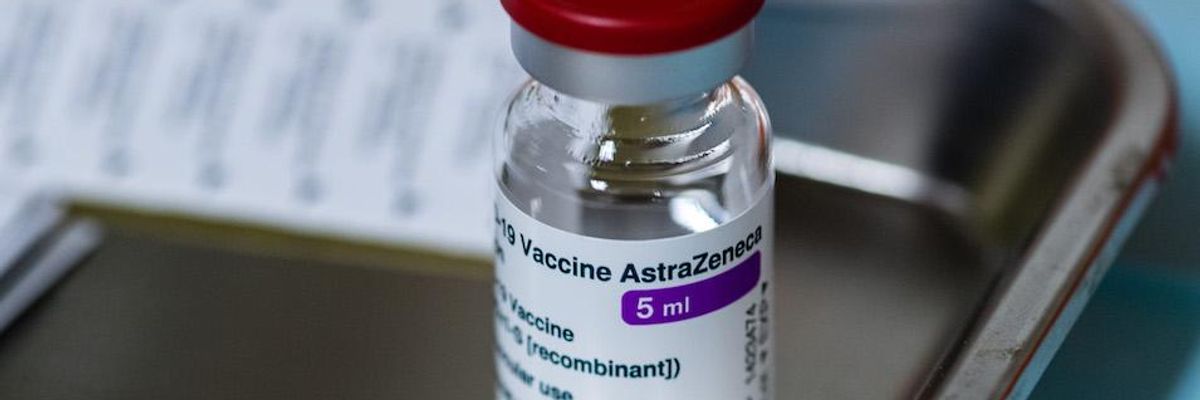The list of countries temporarily suspending use of the coronavirus vaccine made by AstraZeneca grew Monday after France, Germany, Italy, and Spain announced they were taking the precautionary step in light of reports of possible links to blood clots.
The announcements came a day after the Netherlands and Ireland announced they were suspending AstraZeneca jabs. A number of other countries, including Denmark, Norway, Bulgaria, and Indonesia also made that decision in recent days. The Democratic Republic of Congo delayed its vaccine rollout in light of the reports.
"The moves by some of Europe's largest and most populous countries," Reutersreported, "will deepen concerns about the slow rollout of vaccines in the region, which has been plagued by shortages due to problems producing vaccines, including AstraZeneca's."
German health minister Jens Spahn said the decision was based on the recommendation of the nation's vaccine regulator, the Paul-Ehrlich-Institut. "Today's decision is a purely precautionary measure," said Spahn.
Dutch Health Minister Hugo de Jonge made a similar pronouncement, saying, "We can't allow any doubts about the vaccine."
AstraZeneca, for its part, insists its vaccine, produced jointly with the University of Oxford and authorized for use in over 70 countries, is safe. In a statement released Sunday, the company said there was no evidence showing a causal link between its vaccine and "thrombotic events." It also pointed to there being reports of just 37 cases of either deep vein thrombosis or pulmonary embolism noted after vaccination.
"Around 17 million people in the E.U. and U.K. have now received our vaccine, and the number of cases of blood clots reported in this group is lower than the hundreds of cases that would be expected among the general population," said Ann Taylor, AstraZeneca's chief medical officer.
"The nature of the pandemic has led to increased attention in individual cases," Taylor said, and asserted the company was "going beyond the standard practices for safety monitoring of licensed medicines in reporting vaccine events, to ensure public safety."
The World Health Organizations is cautioning nations against pausing their vaccine drives in the midst of the pandemic.
"As of today, there is no evidence that the incidents are caused by the vaccine and it is important that vaccination campaigns continue so that we can save lives and stem severe disease from the virus," WHO spokesperson Christian Lindmeier.
In a statement Monday, the European Medicines Agency similarly stressed its belief that the AstraZeneca vaccine was safe and said it's probing the reports of the adverse health reactions.
"Events involving blood clots, some with unusual features such as low numbers of platelets, have occurred in a very small number of people who received the vaccine," said the agency. "Many thousands of people develop blood clots annually in the EU for different reasons. The number of thromboembolic events overall in vaccinated people seems not to be higher than that seen in the general population."
The vaccine suspensions came as cases of coronavirus is Europe are surging and, as CNNreported, "marked the latest example of the AstraZeneca vaccine dividing Europe." The outlet continued:
The episodes marked the latest example of the AstraZeneca vaccine dividing Europe. In the space of a few weeks, several EU countries have
angrily rebuked the firm for failing to provide its full amount of promised doses; cast then walked back
doubts about its efficacy in older people;
blocked shipments of the vaccine from leaving the continent; and now halted their rollouts over blood clot concerns.
The continent's newest concerns over the vaccine come at a difficult moment, with a third wave of infections threatening to grip Europe one year after the pandemic began.
The AstraZeneca vaccine does not yet have approval for use in the U.S., though the Biden administration is holding onto a stockpile for quicker rollout should that approval come. Reuters reported Monday that emergency authorization could come in April.
Amid the suspensions is sustained criticism that wealthier nations have been vaccination their citizens far more quickly than those in poorer nations. Wealthier nations, including the U.S., are also blocking an India- and South Africa-led proposal for the World Trade Organization to temporarily waive intellectual property rights rules to enable greater production of coronavirus vaccines.
The situation has given rise to accusations of "vaccine apartheid"--an imbalance social justice advocates say can be countered with a "People's Vaccine" that would allow for equitable access to all.
Anna Marriott, health policy manager at Oxfam--a member of the People's Vaccine Alliance--stressed the need for global cooperation to bring the worldwide public health crisis to an end.
"It is unforgivable that while people are literally fighting for breath, rich country governments continue to block what could be a vital breakthrough in ending this pandemic for everyone in rich and poor countries alike," Marriott said in a statement last week.
"During a pandemic that is devastating lives across the planet," said Marriott, "governments should be using their powers now, not tomorrow, to remove intellectual property rules and ensure pharmaceutical companies work together to share technology and fix raw material shortages, all of which are standing in the way of a massive scale-up in production."

